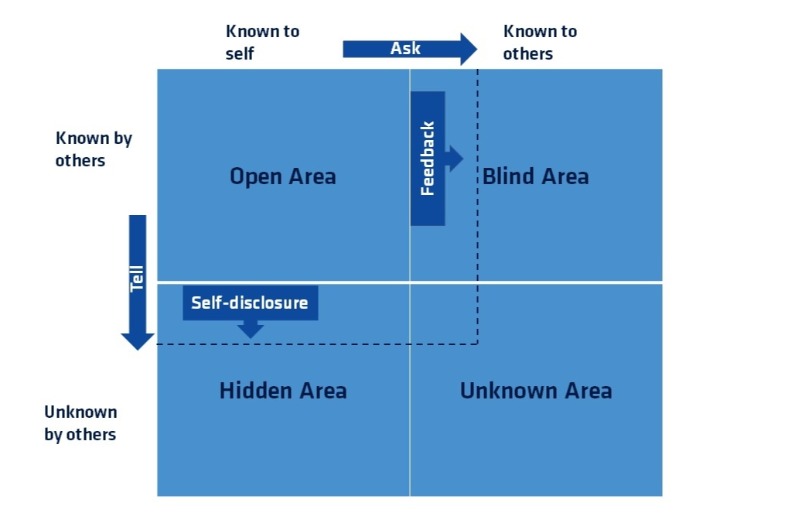We often start our leadership groups and performance improvements with a discussion about how participants can get the most out of the work we’re doing. A bit part of the process is their personal development and what they can do to improve and grow as a member of the team and as an individual.
Johari Window
A model we often use to help people better understand their relationship with themselves and others is one that dates back to the 1950s but still has relevance today in terms of personal and organisational development – the Johari Window.
I start by drawing the outline of the Johari Window and asking the group to fill in the descriptions for each of the quadrants.
As you can see from the diagram above, the window is divided into two axes: one for how you see yourself; and one for how others see you. The body of the window is then divided up into four quadrants.
Open area
The first quadrant that participants are asked to describe is where you know information about yourself and others also know that information.
People correctly use words such as common, or public, or shared to describe this quadrant.
Blind area
The second quadrant is where others observe things about you but you can’t see it.
Participants generally describe this as the perception of others, or blind-spot, or unseen.
Hidden area
The third quadrant is where people have information about themselves that others don’t know. Participants describe this area as private or guarded.
Unknown area
The fourth quadrant often requires a bit of thought for groups to come up with suitable descriptors.
This quadrant is described by the intersection of what others don’t know about you and you don’t know about yourself.
In the first instance, people usually talk about this quadrant as being unclear or unsure. After discussion, they eventually come up with words such as potential, or growth, or untapped ability.
Accessing your potential
In the groups we then talk about what each person or group can do to expand their ‘open’ area.
On the dimension of ‘self’ the question posed is how to open the window further into your blind area. How can leaders find out more about their unknown areas of weakness and potential development?
Groups quickly come up with the solution that the only way to grow in this area of development is to ask more questions; to seek and welcome feedback from others.
On the dimension of ‘others’, the question is how is it possible to expand the window further into the private quadrant where you know things about yourself but others aren’t aware of them.
The only way to grow this area of personal development is for individuals to share their stories and tell others more about themselves – the Johari Window calls this process self-disclosure.
This often leads to a productive discussion around the risks as leaders of sharing more about yourself. Many leaders are concerned that showing vulnerability may lead members of the team to perceive their vulnerability as a weakness, however our experience is that this is a powerful step towards building relationships which we know to be a key component of high performing leaders and their teams.
Creating an environment that supports this growth
If you want to use the Johari Window to support your individual growth and personal development, you should be prepared to undertake two fundamental tasks:
- Ask for and welcome feedback; and
- Disclose information about yourself and allow yourself to be vulnerable.
The more you do this, the more of your area of untapped potential you can access. In a professional setting, this leads to better workplace relationships and increased performance. We often link this to the importance of developing strong professional relationships and having genuine conversations in our own model of high performance.
When all the members of a team understand these fundamentals they are in a great position to help each other develop to their full potential. In our groups we often help teams to construct a series of behaviours (which we call a trademark) to ensure that participants will bring this to life. Examples of these behaviours might include:
- We will challenge each other respectfully
- We will support each other to make it safe to be vulnerable
- We will go out of our way to seek feedback
- If we see it or feel it we will say it.
Do you see these behaviours in your workplace? Have you ever considered what your blind spots or hidden areas might be? Could you work on accessing your untapped potential?




